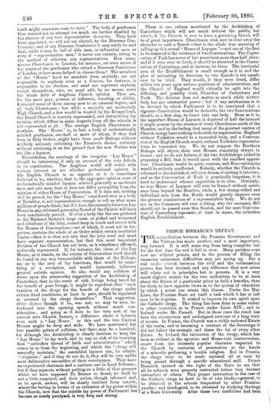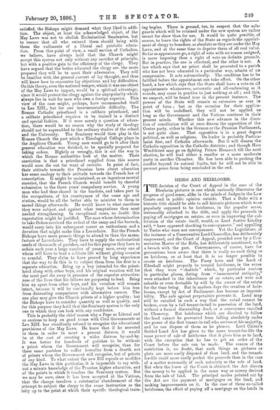PRINCE BISMARCK'S DEFEAT.
THE reconciliation between the Prussian Government and the Vatican has made another, and a most important, step forward. It is still some way from being complete, but for the first time the end is full in view. Many parishes even now are without priests, and in the process of filling the vacancies unforeseen difficulties may yet spring up. But a real modus rivendi between the civil and the eccleaiastical powers has been devised, and any difference that now arises will relate not to principles, but to persons. It is a very much slighter matter for the two authorities to be at issue about the fitness of a particular priest to hold a benefice, than for them to have opposite views as to the system of education by which a priest can attain this fitness. Under the May Laws, the Prussian State set itself a task which it has at last seen to be hopeless. It wished to impress its own spirit upon the Catholic clergy. The thing has been done to some extent in other countries, as in France under Louis XIV., and in Ireland under Mr. Parnell. But in these cases the result has been the unconscious and undesigned outcome of a long train of events. In France, the Church was a richly endowed Estate of the realm, and in becoming a creature of the Sovereign it did but follow the example and share the lot of every other Estate. In Ireland, the laicisation of the clergy, which has been so evident in the agrarian and Home-rule controversies, comes from the intensely popular character imparted to the Church by centuries of persecution at the hands of a minority professing a hostile religion. But in Prussia, the clergy were to be made national all at once by being passed through a specific educational mill. Prince Bismarck insisted on the right of the State to see that all its subjects were properly instructed before they became instructors of others. This proper instruction in the ease of the Catholic clergy he held to be of two kinds,—general, to be obtained in the schools frequented by other Prussian youths ; and theological, to be obtained by studying theology at a State University. After these two conditions had been satisfied, the Bishops might demand what they liked in addi- tion. The object, at least the acknowledged object, of the May Laws was not to abolish Ecclesiastical Seminaries, but to ensure that all who entered them should bring with them the rudiments of a liberal and patriotic educa- tion. From this point of view, a small section of Catholics, we believe, have always held that the Church might accept this system not only without any sacrifice of principle, but with a positive gain to the efficiency of the clergy. They have argued that the better educated the clergy are, the more prepared they will be to meet their adversaries. They will be familiar with the general current of lay thought, and thus will know how to encounter lay objections and lay difficulties. On this theory, even the national temper, which it was one object of the May Laws to impart, would be a spiritual advantage, since it would protect the clergy against the unpopularity which always lies in wait for men who own a foreign superior. This view of the case might, perhaps, have recommended itself to Leo XIII., but for one insurmountable difficulty. The Roman Catholic priesthood is a celibate priesthood, and a celibate priesthood requires to be trained in a distinct and special fashion. If it were merely a question of educa- tion, there would be no reason why the study of theology should not be superadded to the ordinary studies of the school and the University. The Seminary would then play in the Roman Church the part which a Theological College plays in the Anglican Church. Young men would go to it after their general education was finished, to be specially prepared for taking orders. Rightly or wrongly, this is not the way in which the Roman authorities look at the matter. Their conviction is that a priesthood supplied from this source would soon die out for want of recruits. In point of fact, their attitude towards the Prussian laws about education has some analogy to their attitude towards the French law of conscription. It might be maintained, as an ingenious mental exercise, that the French Church would benefit by cheerful submission to the three years' compulsory service. A young man who had thus shared in the burdens, and taken part in the occupations, of his countrymen of the same age and station, would be all the better able to minister to them in sacred things afterwards. He would know to what emotions they were subject, and against what temptations they most needed strengthening. In exceptional cases, no doubt, this expectation might be justified. The man whose determination to take Orders survived the ordeal of the camp and the barrack, would carry into his subsequent career an enthusiasm and a devotion that might make him a Lacordaire. But the French Bishops have more prosaic things to attend to than the manu- facture of Lacordaires. They have to supply the ecclesiastical needs of thousands of parishes, and for this purpose they have to ordain each year a large number of young men, every one of whcm will have to lead a celibate life without giving occasion to scandal. They claim to have proved by long experience that the way to do this is to subject them from the first to a separate education. Bring up a boy intended for the priest- hood along with other boys, and his original vocation will for the most part die away in presence of the superior attractive- ness of the lives that his fellows are purposing to lead. Bring him up apart from other boys, and his vocation will remain intact, because it will b3 continually kept before him free from distracting comparisons with alternative careers. The one plan may give the Church priests of a higher quality ; but the Bishops have to consider quantity as well as quality, and for this purpose they hold that the Seminary system is the only one to which they can look with any confidence.
This is probably the chief reason why a Pope so Liberal and so anxious to keep on good terms with Civil Governments as Leo XIII. has steadfastly refused to recognise the educational provisions of the May Laws. He knew that if he assented to them in order to meet a present distress, it would be at the cost of creating a wider distress by-and-by. It was better for hundreds of parishes to be without a priest whom the Government will recognise, than for these same parishes to suffer hereafter from a dearth not of priests whom the Government will recognise, but of priests of any kind. To what extent the new Bill repeals or modifies the May Laws in this particular, it is impossible to say with- out a minute knowledge of the Prussian higher education, and of the points in which it touches the Seminary system. But we may be sure, since it has been accepted at the Vatican, that the change involves a substantial abandonment of the attempt to subject the clergy to the same instruction as the laity up to the point at which their specific theological train- ing begins. There is ground, too, to suspect that the safe- guards which will be retained under the new system are rather meant for show than for use. It would be quite possible, of course, to leave the rights of the State as regards the appoint- ment of clergy to benefices, as absolute as they are under the May Laws, and at the same time to deprive them of all real value. So far as appearances go, a right of veto with no reason assigned, is more imposing than a right of veto on definite grounds. But in practice, the one is effectual, and the other is not. A law which says that no priest shall be presented to a parish who has not been educated in a particular way, admits of no compromise. It acts automatically. The condition has to be fulfilled before the appointment can take effect. On the other hand, a law which says that the State shall have a veto on all appointments whatsoever, autocratic and all-embracing as it sounds, may come in practice to just nothing at all ; and this, we suspect, will be found true in the present instance. The powers of the State will remain as extensive as ever in point of form ; but as the occasion for their applica- tion will be undefined, they will not be applied so long as the Government and the Vatican continue in their present minds. Whether this new advance in the direc- tion of conciliation will at once disarm the opposition of the Centre party, either in the German or the Prussian Parliament, is not quite clear. That opposition is in a great degree- political, as well as religious. Its leader is probably Particu- larist first, and Catholic afterwards. But it will disarm the Catholic opposition in the Catholic districts ; and though Herr Windthorst may go on fighting Prince Bismarck till the next election, he will lead either a smaller or a more moderate party in another Chamber. He has been able to prolong the conflict beyond its natural limits, but he will not be able to prevent peace from being concluded in the end.



































 Previous page
Previous page